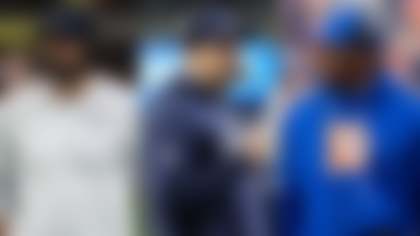WASHINGTON -- The NFL and the NFL Players Association met for six hours Tuesday at the Federal Mediation and Conciliation Service office of George Cohen, and the sides plan to return Wednesday for more labor negotiations.
Though the discussions, which resumed Tuesday after a weekend break, don't have a definite end point, Cohen has cleared his schedule to continue mediation at least through Wednesday.
Seattle Seahawks guard Chester Pitts, part of a large group of players who accompanied NFLPA executive director DeMaurice Smith to the negotiations, said he was "cautiously optimistic" about the talks.
"The fans should know that both parties are hammering away at it and really trying to get a deal done," said Pitts, who attended the first 3½ hours of Tuesday's talks.
Smith and the rest of his group left shortly before 8 p.m. ET -- 52 hours before the current collective bargaining agreement expires.
"We're all committed to the process," NFL general counsel Jeff Pash said before the meeting. "We all know what the calendar is, and we all know what's at stake for everybody. That's why we're here, and we're going to be here as long as it takes and work as hard as we can work to get something done."
Afterward, in keeping with Cohen's order to stay silent on the mediation, neither the league nor the union would discuss if they fared any better Tuesday than they did during more than 40 hours of meetings spread across seven previous days of mediation. When that round ended Thursday, Cohen said the parties still had "very strong differences" on the "all-important core issues."
Most notable at Tuesday's session was the arrival of the New York Giants' John Mara, the first owner to participate in the federal mediation. He arrived with Pash; NFL Commissioner Roger Goodell; outside counsel Bob Batterman; Washington Redskins general manager Bruce Allen and Atlanta Falcons president Rich McKay, who's also chairman of the league's competition committee.
"He's a businessman, and businessmen like to make money," Pitts said of Mara joining the talks. "So sometimes you've got to come, make sure you're hovering around, make sure everything's being done to get a deal done. And I'm pretty sure he'll say he had that sense."
The most notable person absent from this round of mediation, NFLPA president Kevin Mawae, is expected to arrive Wednesday morning, according to a source.
NFL owners have a meeting scheduled for Wednesday and Thursday in nearby Chantilly, Va., for updates on the status of negotiations. Then they will need to determine their next step.
Denver Broncos safety Brian Dawkins, an NFLPA executive committee member, was the first to arrive Tuesday morning. When asked about his mood as negotiations resumed, Dawkins said, "I'm always a positive person."
The group of active players accompanying Smith was the largest by far to come to a mediation session. In addition to Pitts and Dawkins, they included Minnesota Vikings linebacker Ben Leber, Arizona Cardinals kicker Jay Feely, Pittsburgh Steelers quarterback Charlie Batch, Tennessee Titans guard Jake Scott and Indianapolis Colts center Jeff Saturday. Retired players Pete Kendall, Cornelius Bennett and Jim McFarland also attended.
Kendall and McFarland hold union positions, and Bennett said he arrived to advocate for retired players' benefits. Bennett took a shot at Green Bay Packers CEO Mark Murphy for his comments to the New York Times last week.
"The transition for players from playing in the NFL to finding another career and establishing themselves is very difficult, and I really wonder, sometimes, if we do too much for the players," Murphy told the Times. "They've got severance pay and a 401(k) plan. I guess what I'm saying is that sometimes it's not all bad, and going back and talking to some of the players who played for Lombardi in the '60s -- you know, they worked in the offseasons, and they made a very smooth transition into their second careers because they had to.
"And so I'm a little worried that if we do too much for players in terms of compensation after their careers end, and health insurance -- it's not all bad to have an incentive to get a job."
The CBA runs out at midnight as Thursday becomes Friday on the East Coast, and the owners could lock out the players afterward. The union also could decertify -- essentially, declare itself out of the business of representing players -- and let the players take their chances in court.
Buffalo Bills safety George Wilson -- who's not involved in the negotiations but receives updates from the union as his team's NFLPA representative -- doesn't expect a new deal by the deadline.
"Everything I'm telling my guys is: Prepare this Friday for the start of a lockout," Wilson said. "I certainly don't believe a deal will be reached by Thursday (at) midnight. That's what I feel in my heart. I have not received any indication (from the union) that we're close to a deal."
Whatever happens between now and Friday eventually could wind up causing the country's most popular sports league to lose regular-season games to a work stoppage for the first time since 1987. Or everything could be resolved by management and labor in an industry with revenues topping $9 billion annually.
The biggest sticking point all along has been how to divide those revenues, including what cut team owners should get up front to help cover certain costs, such as stadium construction. Under the old deal, owners received $1 billion off the top. They entered these negotiations seeking to double that.
Among the other significant topics in negotiations: a rookie wage scale, the owners' push to expand the regular season from 16 games to 18 while reducing the preseason by two games, and benefits for retired players.
In a Tuesday ruling that could have a significant bearing on the talks, U.S. District Court judge David Doty in Minneapolis sided with the union by overruling a special master's Feb. 1 decision to reject the NFLPA's request that $4 billion in 2011 payments from networks to the league be placed in escrow if there is a lockout.
In many respects, the labor talks boil down to money. And there is plenty of money at risk the longer it takes for the league and NFLPA to work together again.
The league estimates there would be a cut in gross revenues of $350 million if there's no new CBA by August, before the preseason starts, and a loss of revenues totaling $1 billion if no new contract is in place until September. And if regular-season games are lost in 2011, the NFL figures that revenue losses would amount to about $400 million per week.
"We want the fans to know that we're trying. We're trying," Pash said. "We understand our responsibility, and if we don't get it done, we know that we'll have let them down. And we take that very seriously. So do our owners."
Said Pitts: "Both parties are at it, full steam ahead, doing all we can to come to an agreement. It's two groups doing business. The tone? None of that matters. It's business, and that's the approach, and that's the expectation. Doing all we can to get a deal done."
If the league locks out the players, everything would stop except the NFL Draft on April 28-30, and any interviews or workouts teams hold for college players leading up to the draft. After that, though, teams wouldn't be able to contact their picks or sign undrafted rookies.
The Associated Press contributed to this report.



